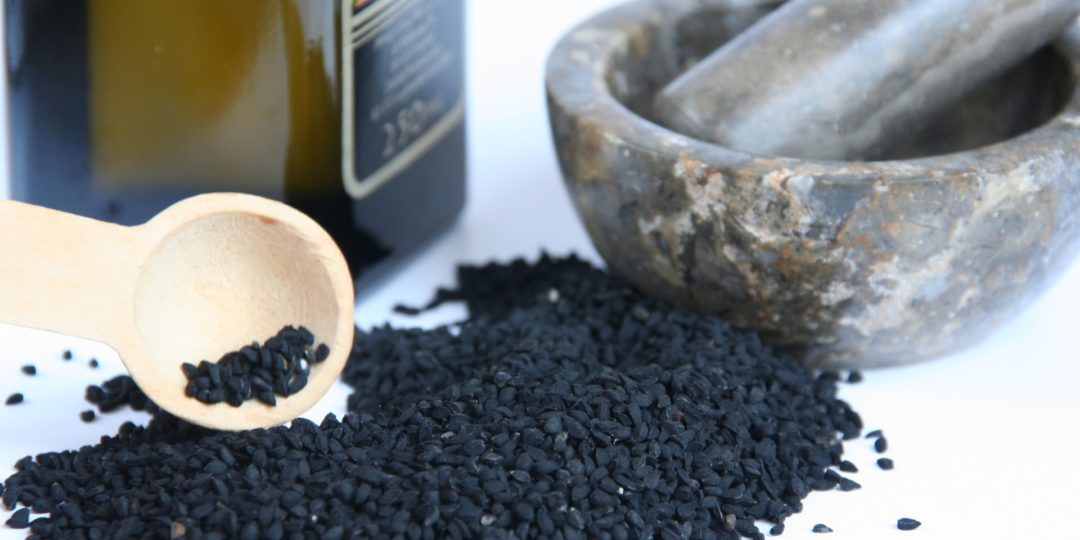Black Seed for Superpowers
So what the heck is black seed oil?
I’m guessing if you’re reading this, that you’re somewhat interested in your health. Or that, at the very least, you want to look and feel better. Well, I’ve got a golden ticket for you: black seed oil.
ORIGINS
Black seeds, technically known as Nigella Sativa, are indigenous to Eastern Europe, the Middle East, and Western Asia. Other names you might hear thrown around for black seeds include Black Cumin, Onion Seed, or Nigella Seeds. The history of Black Seeds as a potent medicinal remedy goes far back – we’re talking as far back as the Pharaohs of Ancient Egypt. The crazy thing is that despite over 3000 years of usage and documentation, black seeds are still quite an unknown in most Western homes. Growing up in an Egyptian home, I’ve always been very familiar with black seeds. Now it’s your turn!
WHY YOU (SHOULD) CARE
Now if my stories don’t convince you to start adding some black seed oil to your day, then some facts probably will. GreenMedInfo.com reports that over 656 studies demonstrating its healing properties have been published within the last 50 years. Check out below just some of the powerful benefits black seeds can offer:
Anti-bacterial – We’ve all heard of the progressive rise in multidrug-resistant (MDR) bacterial strains, which poses a serious threat to the way we currently treat infectious diseases. That means scientists are looking for new ways to treat pathogens in place of commonly prescribed antibiotics. There is very promising research being performed with Nigella Sativa as an antibacterial, specifically against Salmonella, Heliobacter Pylori, and E-Coli1.
Anti-aging – Fountain of youth? The antioxidants and anti-apoptosis properties of black seed oil have been proven to create an anti-aging effect. That means a reduction in oxidative stress, hepatotoxicity, and neurotoxicity2.
Radiant skin – Along with fighting wrinkles, black seed oil can help the overall health of our skin. Packed with vitamins such as A, B, C, Calcium, Potassium, Magnesium, Zinc, and other trace elements – it provides the necessary nutrients for skin recovery and repair3. It also has the ability to treat skin conditions such as eczema, psoriasis, and acne. Yup, adding a small amount of Black Seed Oil to your lotion can make those pimples disappear over time 4.
Digestive Aid – Even Hippocrates was said to have used Nigella Sativa for digestion woes. The seeds are carminative, meaning they can aid digestion, decrease bloat, and relieve cramping 5.
Weight management – In addition to regulating appetite, studies have shown black seed improve glucose absorption and lower excess body weight. These findings have prompted many professionals to recommend Nigella Sativa for patients with Type 2 Diabetes6.
Athletic Performance – What if you could work out for longer and recover faster – sounds awesome, right? Black seed oil has been shown to do just that. Small doses of black seed oil ignite stress defense mechanisms in the body, a huge game-changer for performance or endurance-based athletes7.
Disease Fighting – In studies, the phytochemicals in Nigella Sativa can actually result in a decreased amount of cancerous cells. Specific cancers that have shown the most improvements from the addition of black seed oil include Colon, Prostate, Pancreatic, and Lung8.
Joint Relief – Applied topically, black seed oil has been proven effective in reducing pain for patients with osteoarthritis9.
HOW TO USE IT
Instead of going on Amazon and buying the biggest bags of black seeds you can find, try supplementing with the oil. The oil is a concentrated form of the seed, which means that consumption should not exceed a few teaspoons per day. Overall, keep it smart guys – you don’t want to overdo it. Look to purchase an organic, cold-pressed variety with no additives.
The oil that I use I get from the motherland but I also use this one HERE.
If you do want to go the seed route in the kitchen you can incorporate them by throwing them on salads, into bone broth (like THIS ONE), over scrambled eggs, etc but I believe I first introduced you guys to black seeds through a recipe for preserving Meyer lemons, which you can visit here: Egyptian Preserved Lemons
For seeds, I use this brand HERE.
Of course, ask your doctor before trying any new supplement (see my disclaimer below).
THAT’S A WRAP
Convinced or at least intrigued yet? Keep an eye out as black seed oil sneaks more into the mainstream. Personally, I’m excited to see additional studies regarding how we can use it as a natural medicinal alternative. Guess my ancestors were really onto something. 😉
Share your thoughts below, or let me know in the comments your favorite way to use Black Seeds
DISCLAIMER I am not a doctor, certified nutritionist, or dietician. I am simply a private chef sharing something that I personally use. Always seek professional medical advice before starting a new supplement, especially if you’re pregnant or breastfeeding. Links in this post are not affiliates and are completely unsponsored.


